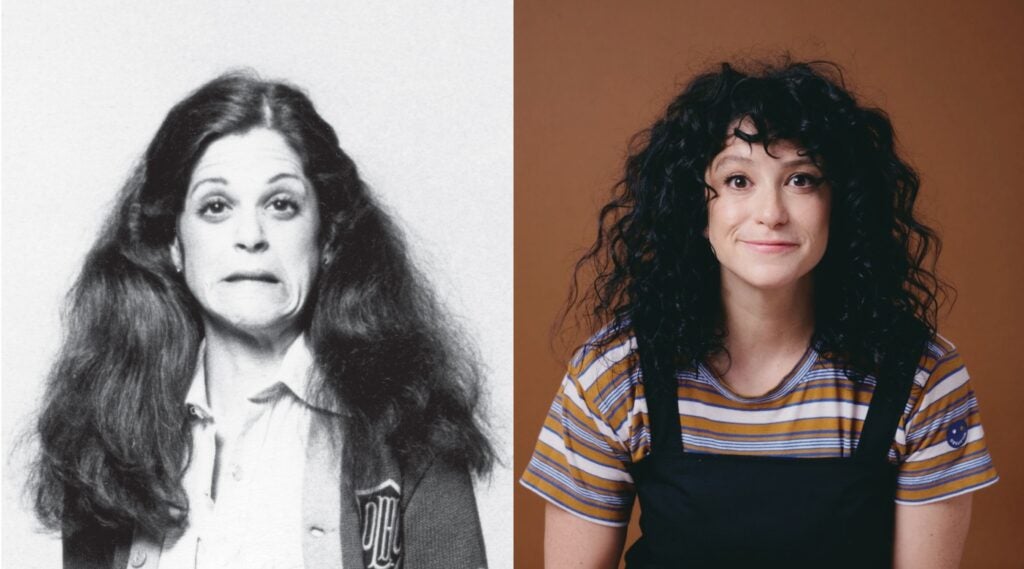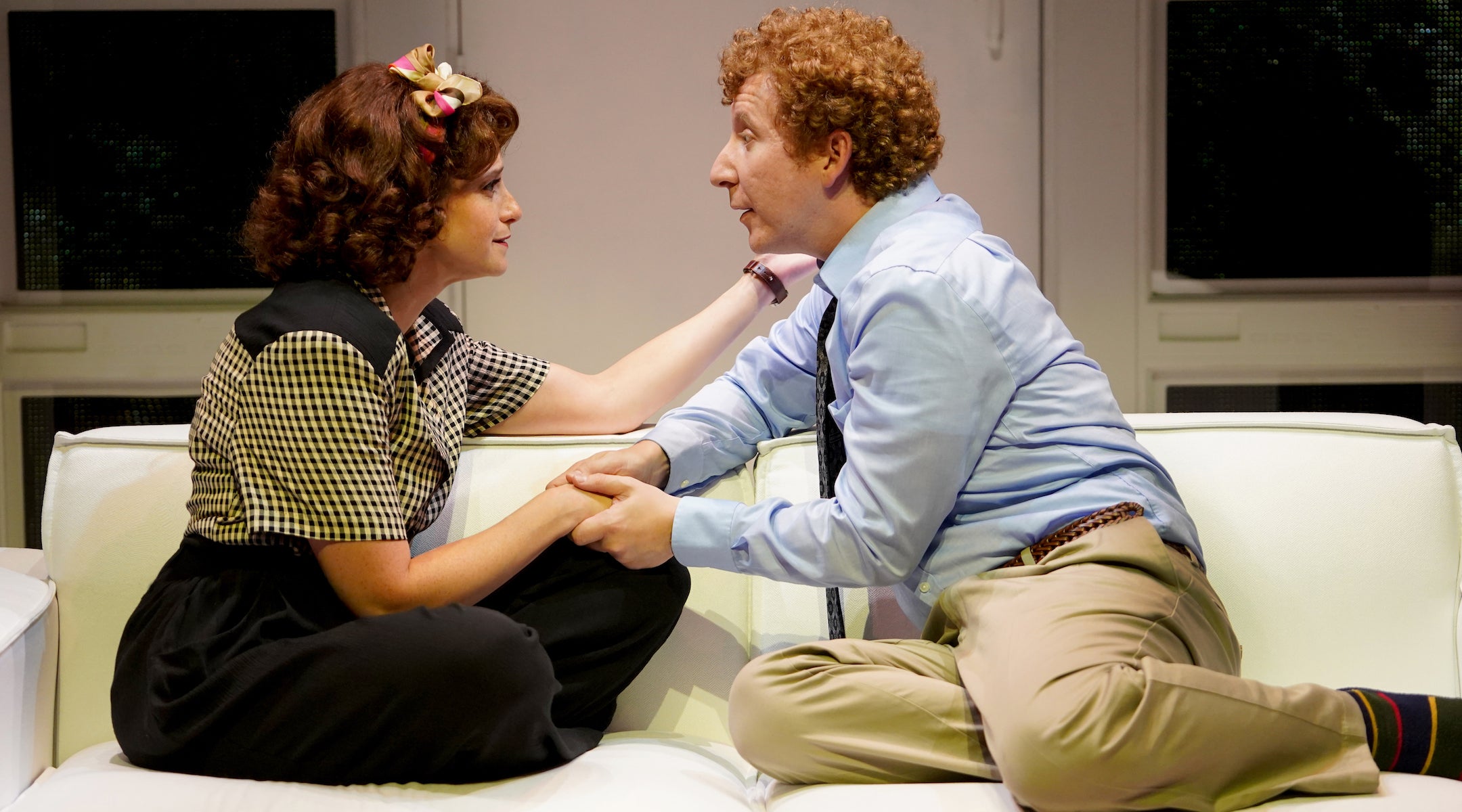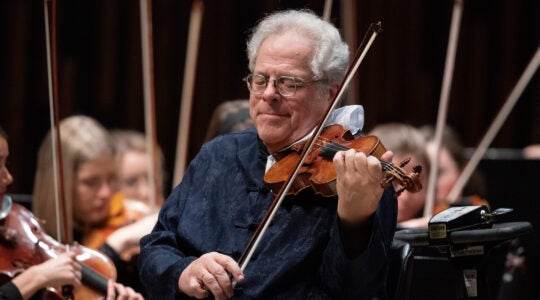For those who miss the very funny, very Jewish presence of the late comedy icons Gene Wilder and Gilda Radner, a new off-Broadway play that tells the story of their eight-year relationship practically brings the legends back to life.
“Gene & Gilda,” written by Cary Gitter and directed by Joe Brancato, is playing at 59E59 Theater on the Upper East Side through Sept. 7. Touted as “heartfelt and hilarious,” the 80-minute new play takes the audience through the entirety of Radner’s and Wilder’s romance, which began in 1981 on the set of the the film “Hanky Panky” and ended when Radner tragically died of ovarian cancer in 1989 at 42.
The relationship between Wilder, an actor, director and writer, and the “Saturday Night Live” star 13 years his junior was well documented in the media — for Radner, it was love at first sight. “My heart fluttered — I was hooked,” she wrote in “It’s Always Something,” her 1989 memoir. “It felt like my life went from black and white to Technicolor.”
The play’s extraordinary cast tells the full story of the couple’s occasionally up-and-down romance, starting from their first night together when Gilda declares their union as “a match made in mishegoss.” Jonathan Randell Silver, with his nebbishy demeanor and naturally curly hair, effortlessly channels Wilder, while Jordan Kai Burnett’s spunk, comedic delivery and occasional turn of Yiddish phrase is pure Radner.
In fact, there were few moments during “Gene & Gilda” — especially during a standout 90-second sequence in which Burnett cycles through a rapid-fire conversation among a hodgepodge of Radner’s most beloved characters — when I had to remind myself that I was not, in fact, seeing the actual Radner in the flesh.
As it happens, Burnett, who originated the role of Radner in “Gene & Gilda” at Penguin Rep Theater in Stony Point, New York, in 2023, also played the Jewish comedian that same year in a New York workshop of a different play, “Not Ready for Prime Time,” about the inception of “Saturday Night Live.”
“I feel really, really lucky — I love her, I’ve always loved her,” Burnett, who is Jewish and lives on the Upper West Side, tells me. “I feel like it’s my responsibility to honor her and not do an impression of her. Anytime I ever play Gilda — may I play her for ages and ages — I want it to feel like this is my interpretation of someone who I so deeply admire in so many capacities.”
I caught up with Burnett, who uses both she and they pronouns, to discuss her love of Radner, how she prepared for the role, and what it was like to receive a standing ovation for playing the Jewish comedian’s iconic characters.
This interview has been lightly edited and condensed.

Gilda Radner, left, and Jordan Kai Burnett, right, who plays the Jewish comedy icon in “Gene & Gilda.” (Anthony Barboza/Getty Images and Jenny Anderson)
Do you have a first memory of Gilda Radner?
The first Gilda thing that I remember is being young — like young, young, maybe 7 or 8 — and seeing an old clip of Gilda doing the ad for Jewess Jeans. It is really, truly, in its simplicity and its executions, so beyond its time and it has, I think, lived with me my whole life, just because it’s so funny and it’s also so, so excellent.
How did you prepare to play Gilda?
Having already been very familiar with her work, I thought that it would be irresponsible to not go back and kind of double down. So I went back and I watched all of the greatest hits of Gilda, all of the B-sides of Gilda. I reread “It’s Always Something,” I watched “Love, Gilda,” which is a wonderful documentary about her. I went back and watched her episode of “The Muppet Show,” and then I sort of deep dove into the world that existed of the two of them, the interviews that existed of the two of them.
Between that and between that and working with my dialect coach, Charley Layton, who helped me find the specificity of her accent — her normal, day to day accent — and helped me find some things like mannerisms and things that she does with her face, like she kind of always has this kind of smile, even when she’s angry, there’s this lift in her face.
That particular 90-second or so sequence was amazing, when you play several of Gilda’s best-known characters — like Lisa Loopner and Emily Litella — in conversation with each other, in quick succession. I can’t imagine what it’s like to play a famous actor who in turn plays a famous set of characters. How do you rehearse for that?
If I think about it too much, my brain will break. That’s why I call it “the 90 seconds where I blackout.” If I start to overthink it, all the wheels come off the train.
Every time I do it, it feels like I have to make sure they’re really having a conversation. It’s much funnier if they really connected, and you could really imagine all five of them in the same room.
Judaism was a key part of Gilda’s identity. Some of her “SNL” characters, such as Rhonda Weiss, were Jewish, and she even lit a Hanukkah menorah in one episode. Do you draw upon your own Jewish identity to play her?
I don’t know how you couldn’t, and I say that with all the love in the world. I just think to be Gilda, to play a real Jewish person, you have to bring your Judaism to it. Doing the show the first time in 2023, I felt like, wow, this is the closest I’ve been to my Judaism since I was probably 20 years old.
She was such an icon for all comedians, but also to be a young Jewish woman who was living in her very authentic Judaism, in the sense of how we all think of it — she was tough and she was loud and she was zany and she was funny, all these things that are often equated to people with a Jewish identity. But she owned it, and she made it sexy and funny and kind of rebranded it. To me, she’s as cool as it gets.
“Gene & Gilda” is at 59E59 Theaters (59 East 59th St.) through Sept. 7. For tickets and information, click here.
Correction: This article has been updated to clarify that Gilda Radner died of ovarian cancer, not cervical cancer.
The New York Jewish Week brings you the stories behind the headlines, keeping you connected to Jewish life in New York. Help sustain the reporting you trust by donating today.





